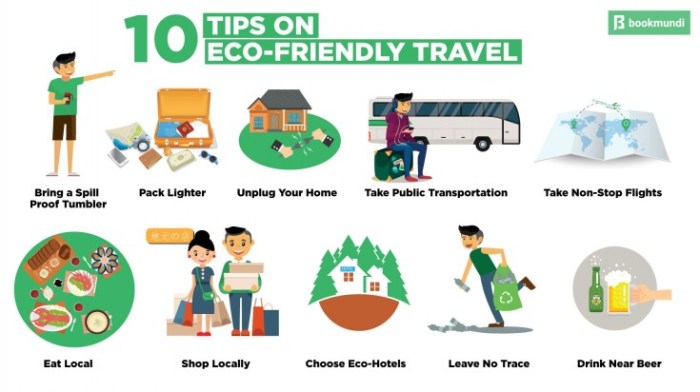Embark on an eco-conscious journey with our comprehensive guide to eco-friendly travel tips. As responsible travelers, we can minimize our environmental impact while enriching our experiences and fostering a deeper connection with the destinations we visit.
Discover sustainable transportation options, eco-friendly accommodations, and responsible activities that align with your values. Learn how to pack light, make sustainable food choices, and immerse yourself in local cultures while respecting traditions and supporting local businesses.
Sustainable Transportation

When traveling, it’s essential to consider the environmental impact of your transportation choices. Opting for eco-friendly options can significantly reduce your carbon footprint and promote sustainable tourism.
Public Transportation
Public transportation, such as buses, trains, and subways, is a great way to travel within cities and between destinations. It reduces traffic congestion, air pollution, and greenhouse gas emissions. Public transportation is often affordable, reliable, and convenient, making it a smart choice for both locals and tourists.
Walking and Biking
Exploring destinations on foot or by bike is not only an eco-friendly option but also a great way to immerse yourself in the local culture and sights. Walking and biking allow you to connect with your surroundings, discover hidden gems, and promote physical activity. Many cities offer bike-sharing programs and designated bike lanes for safe and enjoyable cycling.
Air Travel Alternatives
Air travel has a significant environmental impact due to its high carbon emissions. Consider alternative modes of transportation for long-distance journeys, such as trains or buses. Night trains, in particular, can be a comfortable and scenic way to travel while reducing your carbon footprint. For shorter distances, consider carpooling or ride-sharing services to minimize the number of vehicles on the road.
Accommodation Choices

When selecting accommodations during your travels, it’s essential to consider their environmental impact. Opt for establishments that prioritize sustainability and implement eco-friendly practices.
Look for hotels, guesthouses, or vacation rentals that have received eco-certifications or adhere to sustainability standards. These certifications often involve rigorous assessments of energy efficiency, water conservation, and waste reduction efforts.
Energy Efficiency
Energy-efficient accommodations utilize renewable energy sources, such as solar or wind power, to reduce their carbon footprint. They also employ energy-saving measures like LED lighting, motion sensors, and efficient appliances.
Eco-friendly travel is about minimizing our environmental impact while exploring the world. Whether you’re exploring scuba diving locations or hiking through national parks, there are ways to reduce your footprint. Pack light, recycle, and use public transportation when possible. Consider offsetting your carbon emissions by supporting organizations that plant trees or invest in renewable energy.
Water Conservation, Eco-friendly travel tips
Water conservation is crucial in eco-friendly accommodations. Look for establishments that implement water-saving fixtures, such as low-flow toilets and showerheads. They may also have rainwater harvesting systems or use greywater for irrigation.
Waste Reduction
Waste reduction is another key aspect of sustainable accommodations. They minimize waste generation by using reusable amenities, offering recycling programs, and composting organic materials. Some may even have zero-waste policies.
Responsible Activities
To ensure that your travel experiences are eco-friendly, it’s crucial to choose activities that minimize environmental impact. Respecting local ecosystems and wildlife is paramount, as is reducing waste and pollution during activities.
Wildlife Encounters
- Opt for wildlife viewing tours that prioritize animal welfare and minimize disturbance.
- Maintain a respectful distance from wildlife and avoid feeding or touching them.
- Support conservation efforts by choosing tour operators that contribute to wildlife protection.
Outdoor Activities
When engaging in outdoor activities like hiking, biking, or kayaking, be mindful of the environment.
- Stay on designated trails to avoid damaging vegetation and wildlife habitats.
- Pack out everything you pack in, leaving no trace of your presence.
- Use reusable water bottles and avoid single-use plastics to reduce waste.
Cultural Activities
Cultural immersion is a key part of travel, but it’s essential to respect local customs and traditions.
- Learn about local etiquette and dress codes before visiting sacred sites or interacting with communities.
- Support local businesses and artisans to preserve cultural heritage and traditions.
- Avoid purchasing souvenirs that exploit or harm wildlife or the environment.
Eco-Conscious Packing: Eco-friendly Travel Tips
Packing light and reducing waste are essential aspects of eco-friendly travel. By adopting sustainable practices, you can minimize your environmental impact while ensuring a comfortable and enjoyable trip.
One of the most significant ways to reduce waste is to use reusable items. Opt for reusable water bottles, coffee cups, and shopping bags instead of single-use plastics. These items are not only eco-friendly but also help you save money in the long run.
Choosing Eco-Friendly Toiletries and Essentials
When it comes to toiletries and other essentials, choose eco-friendly options. Look for products made with natural ingredients and biodegradable packaging. Avoid single-use items like plastic razors and disposable toothbrushes. Instead, opt for reusable alternatives like bamboo toothbrushes and safety razors.
Food Choices
Making sustainable food choices while traveling is essential for minimizing your environmental impact. By supporting local farmers and choosing seasonal produce, you can reduce transportation emissions and promote biodiversity. Additionally, reducing food waste helps conserve resources and prevent greenhouse gas emissions.
Eating Local and Seasonal Produce
Consuming local and seasonal produce reduces transportation distances, minimizing carbon emissions associated with food transport. Local farmers often use sustainable farming practices, preserving biodiversity and supporting the local economy. Seasonal produce is typically fresher, more nutritious, and often less expensive than produce shipped from distant locations.
Reducing Food Waste
Food waste is a significant contributor to greenhouse gas emissions. To reduce waste, plan your meals in advance, order smaller portions, and request doggy bags for leftovers. Consider composting food scraps or donating excess food to local shelters or food banks. By reducing food waste, you conserve resources, reduce emissions, and support those in need.
Cultural Immersion
Embracing local cultures and traditions is crucial for sustainable travel. Respecting the customs and beliefs of host communities fosters understanding, preserves heritage, and ensures a positive experience for both travelers and locals.
When interacting with locals, it’s essential to be mindful of appropriate behavior. Learn basic greetings and phrases in the local language, dress modestly, and avoid offensive gestures or topics. Engage in conversations with respect and curiosity, asking questions about local traditions and perspectives.
Supporting Local Businesses and Artisans
Supporting local businesses and artisans not only contributes to the local economy but also preserves cultural heritage and reduces the environmental impact of mass tourism. Choose locally-owned restaurants, guesthouses, and tour operators that showcase the region’s unique flavors, architecture, and experiences. By purchasing handmade crafts and souvenirs from local artisans, you support their livelihoods and promote the preservation of traditional skills.
Carbon Offsetting
Carbon offsetting is a way to reduce the environmental impact of your travels by funding projects that reduce greenhouse gas emissions. It involves calculating the amount of carbon dioxide (CO2) you emit during your trip and then purchasing carbon credits to support projects that remove or reduce an equivalent amount of CO2 from the atmosphere.
There are many different ways to calculate your carbon emissions, including online calculators and apps. Once you have calculated your emissions, you can purchase carbon credits from reputable organizations that offer carbon offsetting programs. Some of these organizations include:
Reputable Carbon Offset Providers
- Gold Standard
- Verified Carbon Standard
- American Carbon Registry
- Climate Action Reserve
Educational Opportunities

Integrating educational experiences into eco-friendly travel enhances your journey and promotes environmental awareness. By delving into local environmental issues, volunteering, and engaging in conservation projects, you can gain valuable insights and make a meaningful contribution to the destinations you visit.
To minimize your environmental impact while traveling, consider eco-friendly practices like packing light, using reusable water bottles, and supporting local businesses. If you’re an avid diver, explore the breathtaking underwater world at scuba diving locations around the globe while adhering to responsible diving practices.
Remember, preserving the delicate marine ecosystem ensures future generations can enjoy these wonders.
Understanding Local Environmental Issues
Familiarize yourself with the environmental challenges and initiatives in the regions you visit. Read local newspapers, attend community meetings, or connect with environmental organizations to understand the issues affecting the area. This knowledge will inform your choices and foster a deeper appreciation for the natural and cultural heritage of the destination.
Volunteering and Conservation Projects
Participating in conservation projects or volunteering with local organizations allows you to contribute directly to environmental protection. Engage in activities such as beach cleanups, reforestation efforts, or wildlife conservation initiatives. These experiences not only benefit the environment but also provide a unique opportunity to connect with locals and learn about their perspectives on environmental stewardship.
When traveling with the family, it’s important to consider eco-friendly practices to minimize your environmental impact. From choosing sustainable transportation options to packing reusable items, there are many ways to make your trip more eco-conscious. If you’re on a budget, consider budget family vacations that offer discounts for eco-friendly travel.
Additionally, look for accommodations that prioritize sustainability and offer amenities like recycling programs and energy-efficient appliances. By incorporating eco-friendly practices into your family vacation, you can not only save money but also teach your children the importance of environmental stewardship.
Last Word
By embracing eco-friendly travel practices, we not only reduce our carbon footprint but also create a positive ripple effect on the destinations we explore. Let’s be mindful travelers, leaving a legacy of sustainability for future generations to cherish.
Question Bank
What are the benefits of eco-friendly travel?
Eco-friendly travel minimizes environmental impact, supports local communities, fosters cultural preservation, and enhances personal experiences.
How can I reduce my carbon footprint while traveling?
Consider using public transportation, walking, or biking instead of flying. Choose accommodations with energy-efficient practices and opt for activities that minimize waste and pollution.
What are some tips for packing light and eco-consciously?
Use reusable items, avoid single-use plastics, and choose eco-friendly toiletries. Pack light to reduce baggage weight and carbon emissions.